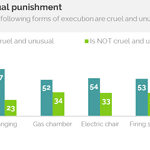
Ohio cannot obtain drugs to carry out executions without putting public health at risk, Governor Mike DeWine (pictured) announced on July 31, 2019. DeWine told reporters that pharmaceutical manufacturers are unwilling to sell the state drugs for executions and have threatened to stop selling medicines to any state agency if they suspect the drugs might be diverted from therapeutic use to use in executions. A sales embargo could mean that the state would not be able to obtain medicines for treatment of patients at veterans’ homes, state and community drug and alcohol addiction services, and the Department of Youth Services.
In recent years, Ohio had purchased the drugs it used in executions through its Department of Mental Health and Addiction Services without telling the drug suppliers how the medicines would be used, and then drove the drugs to the state’s execution facility. “If pharmaceutical companies discontinue supplying medications to the state of Ohio for these populations that are currently being served, it would put tens of thousands of our citizens at risk,” DeWine said. “Drugs they need for their health will be put in peril.” DeWine said that, as a result of these public health risks, the state may need to reconsider its execution method. “So there is a real threat which we have to take into consideration, which [the Ohio Department of Rehabilitation and Correction] has to take into consideration — that the use of a particular drug that we would announce that would be used in (an execution) protocol might result in that particular drug company cutting off the state of Ohio,” the governor said. DeWine said he plans to meet with House Speaker Larry Householder and Senate President Larry Obhof to discuss what actions the state should take. None of the three men would speculate on the likely course of action, but Obhof said, “I think all three of us approach the issue with an open mind.”
Later in the day, DeWine announced that the state would not go forward with the scheduled September 12, 2019 execution of Warren Keith Henness. That execution, DeWine said, would be rescheduled for May 14, 2020. It is the second time DeWine has rescheduled Henness’s execution. In January 2019, the governor granted a six-month reprieve to Henness in the wake of a federal court ruling in his case that compared Ohio’s three-drug execution protocol to waterboarding and chemical fire. Judge Michael Merz wrote, “If Ohio executes Warren Henness under its present protocol, it will almost certainly subject him to severe pain and needless suffering. Reading the plain language of the Eighth Amendment, that should be enough to constitute cruel and unusual punishment.” The state had planned to use a three-drug protocol beginning with midazolam, a sedative which has been involved in problematic executions in several states. In February 2019, Gov. DeWine announced that he would halt executions until the state developed a new execution protocol and it was approved by courts.

A lawsuit is currently pending in which Ohio death-row prisoner Cleveland Jackson is proposing that the state execute him by firing squad, saying it would be less painful than lethal injection and avoids the ethical problems of medical professionals participating in executions. “In a state with extremely limited firearms laws and with numerous law-enforcement agencies with officials qualified as marksmen, there is no concern about involving persons whose professional ethics rules or traditions impede their participation,” Jackson said in a court filing. A 2015 poll found that 53% of Americans believe the firing squad is a cruel and unusual method of execution.
Pharmaceutical companies have overwhelmingly opposed the use of their products in execution, but states have engaged in subterfuge to avoid distribution restrictions. In 2018, for example, a Nevada judge found that state officials had “intentionally defrauded” a drug distributor by shipping drugs to a state office more than 200 miles from the state prison in order to disguise their intentions to use them in executions. Multiple drug companies also sued the state of Arkansas for misleading them into selling execution drugs by implying that they would be used for a legitimate medical purpose.
Marty Schladen and Randy Ludlow, DeWine again delays Columbus man’s execution after admitting state can’t get lethal injection drugs, The Columbus Dispatch, July 31, 2019; Andrew Welsh-Huggins, Governor: Ohio Having Difficulty Finding Execution Drugs, Associated Press, July 31, 2019.
Read DPIC’s Nov. 2018 report, Behind the Curtain: Secrecy and the Death Penalty in the United States.
Lethal Injection
Nov 22, 2024


